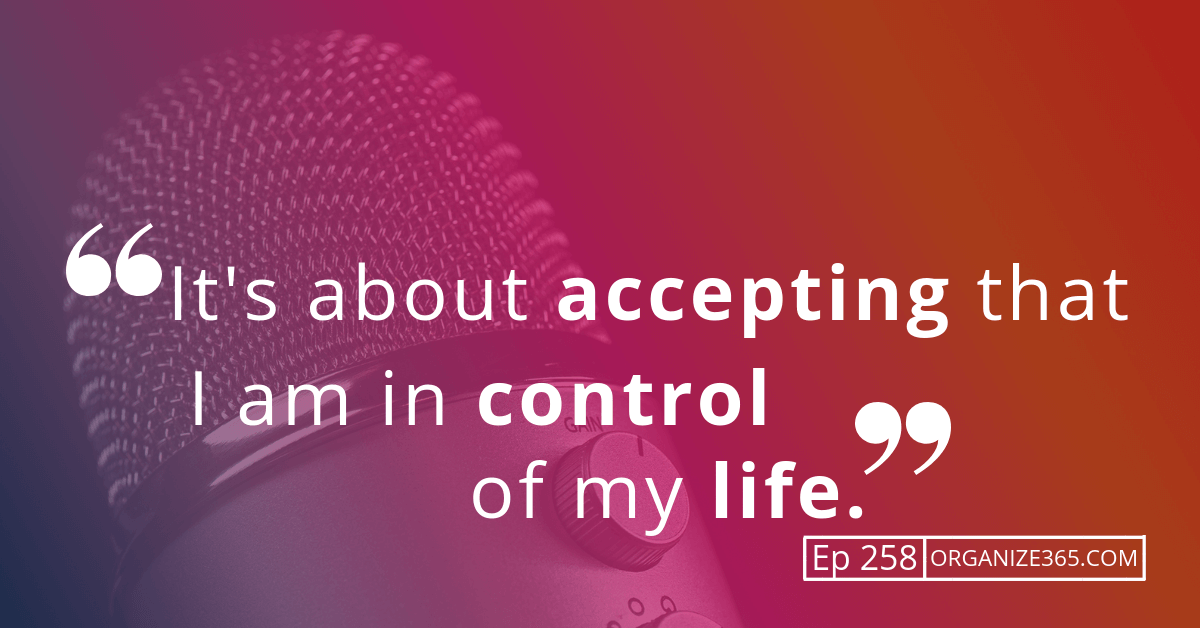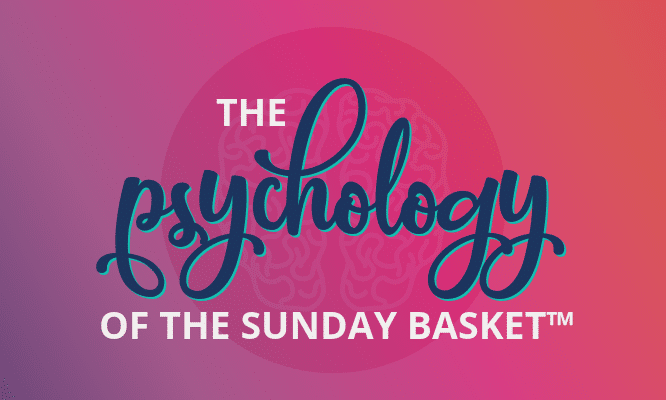
Last week, I interviewed the wonderful Julie Morgenstern, and we ended our chat by discussing the importance of women having hobbies and passions.
It’s one of the most difficult things for us to come to terms with, I think.
We feel so pressed for time and so bogged down by the stress of our responsibilities that we have a hard time imagining what that would look like.
In the second installment of my winter interview series, I’m digging into the brain science behind why women feel that sense of overwhelm and burden.
And while I did a ton of research on the brain for my books, The Mindset of Organization and How ADHD Affects Home Organization, I’m not an expert in psychology, so I invited one onto the podcast.
I know you’ll love Holly Knill, Licensed Clinical Professional Counselor in Maryland, and the neuroscientific perspective she offers us in this episode.
Link Between Depression and Anxiety
Holly first heard me on the podcast when I was talking about my depression story.
And while depression can begin to affect a person for a myriad of reasons, Holly says that it begins with a change in thinking.
Our brains become unable to sort through and prioritize the everyday stresses of life, and we neurologically become unable to respond to them the way that we used to.
I don’t suffer from anxiety, but I am close to many that do. Holly says that depression and anxiety can be linked because the feelings of depression can make a person anxious. When I was going through it, I called it “spiraled thinking.” I’d feel depressed, and then anxious about how my feelings were affecting my life, then I’d start to feel depressed about that, and so on.
If you’re feeling depressed, I always recommend sharing these feelings with your doctor and seeking help. You can also contact the National Suicide Prevention Lifeline for free, 24/7.
How to Change Patterns and Habits
Aside from a true chemical imbalance, changing the way we do things is a matter of changing patterns and habits.
The leaders of the home (mostly the women) have unending to-dos and bear a huge burden to keep the house maintained, the schedules intact, and the errands completed. Those thoughts are taking up so much space and causing so much anxiety.
We feel overwhelmed for good reason!
That’s where The Sunday Basket comes in. Keeping your paper in one spot and routinely maintaining it sounds like the solution you’ve been looking for! You’re totally in, you buy it, but then what?
How do you change your patterns and habits to fully make The Sunday Basket work for you?
Change
Everyone who buys a Sunday Basket has already decided that they want to change something, for whatever reason. You have to be clear on that change first so that you know what the true goal of the box will be.
Maybe you are fed up with the piles of paper in your house.
Maybe you are done being embarrassed because you missed another payment, forgot another birthday card, or let another policy lapse.
Maybe you are ready to feel like you’re running your life, instead of it running you.
Whatever the thing you want to change, investing in the system tells your brain that you’re serious about it and that you believe that you will get the benefit of it.
You are also coming to terms with a behavior or habit you have that you recognize is not serving you. Before you can commit to making that change, you have to analyze your behavior and see the areas that need improvement.
Or, in short, you can’t change anything you can’t accept.
Acceptance
It’s not that hard to accept that you have extra clutter or too much paper, because the answer is very visual.
But it is very difficult to accept that you can change that. That you have everything you need, inside and out, to solve this problem.
That you are in charge. You are in control.
It’s very easy to let our situations dictate what we do. When we can say, “I’m doing this out of obligation, and I have no time because I have so many obligations,” we get to hide behind that. No one can criticize us for how we use our time, because we must use it that way. We think have no choice, and being caged in by obligations feels safe.
There’s a lot of ownership and agency associated with taking control, and that can bring out a lot of fear.
Feelings
We have to come to terms with the feelings that we have. That responsibility, that anxiety, that fear.
A lot of people say “I can’t be organized,” and that’s not true, but it’s driven by fear that they can’t. Not only that, it’s motivated by fear that they can.
What if I succeed at this? Now I’m going to be accountable for being organized going forward, when my mental story has always been, “I’m not an organized person.”
It’s a real shift in identity!
It’s surprising to discover feelings that are so raw and deep when you’re talking about household paper clutter, isn’t it?
We create crises so that we can solve the problem so that we can feel good about it. Or, we create crises, so that we can use them as an excuse not to do the hard things.
Why do our brains work that way?
Neuroscience
Our brains are wired to think negatively. This is evolutionary because the negative things in our lives once could have killed us, so we’re wired to consider those things.
But in the society we live in, we can be proactive. We don’t have to constantly consider every possible danger, because our society has modernized enough that many of those things aren’t emergent concerns anymore.
We have to retrain our brains.
Holly says that the key to re-training our brain is to consciously create a habit by maintaining a routine. It’s simple, but not easy.
The Sunday Basket gives you the how. It’s a skill and a tool that helps you be proactive.
Physical Presence
By putting our paper into an actual place on our counter, rather than, say, on an electronic filing system, we create a physical presence for it.
If we think of our brains like hard drives, the more we try to remember, the less room there is for anything else.
Don’t fill up your hard drive with stuff. Keep it active! Clear your thoughts by writing them on paper, putting them in the basket, and planning to act on them.
Sometimes, just the act of creating a slash pocket sends the message to our brain that it’s real. Having a far-away goal of reading more books sounds wonderful, but if it’s just a thought in your brain, it’s easy to discount it. But once you have a slash pocket, you’re more likely to look up books you want to read, keep a list, and remember to check books out of the library. Once that book is in your home, you’re more likely to pick it up and actually read it.
The physical presence matters!
I had such a wonderful time talking with Holly today, and I hope you enjoyed our conversation! You can learn more about The Sunday Basket here.




